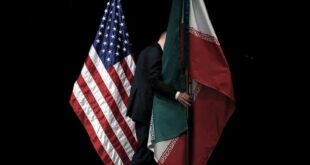 TEHRAN (FNA)- A senior military commander warned on Saturday that any attack on Iran would start a new world war.
TEHRAN (FNA)- A senior military commander warned on Saturday that any attack on Iran would start a new world war.
“Any aggression against Iran would be the start of the world war, ” deputy chief of staff for defense publicity, Brigadier General Masoud Jazayeri said.
The United States and Israel have repeatedly warned of military action against Iran. Israel and its close ally the United States accuse Iran of seeking a nuclear weapon, while they have never presented any corroborative document to substantiate their allegations. Both Washington and Tel Aviv possess advanced weapons of mass destruction, including nuclear warheads.
Iran vehemently denies the charges, insisting that its nuclear program is for peaceful purposes only. Tehran stresses that the country has always pursued a civilian path to provide power to the growing number of Iranian population, whose fossil fuel would eventually run dry.
“The unrestrained greed of the US leadership and global Zionism… is gradually leading the world to the edge of a precipice,” Jazayeri said, citing the unrest in Afghanistan, Iraq, Sudan and Georgia.
“It is evident that if such a challenge occurs, the fake and artificial regimes will be eliminated before anything,” he said, without naming any countries.
Iran vowed a crushing response to any attacks and has flexed military muscles in recent years by holding war games and unveiling an array of home-grown weaponry including ballistic missiles.
Another top military commander said Iran was prepared to “take the enemies off-guard” and would unveil more weapons in case of an attack.
“Some of the equipment of our armed forces have been announced but there are important things hidden whose effect would be shown on the day (of any attack),” deputy army commander Abdolrahim Mousavi told FNA.
“Offensives are part of the strategy of defense and if a country confines itself to its borders it has set a limit and eliminated part of its capability,” he said.
During war games in July, Iran warned that it would target US bases and US ships in the Persian Gulf as well as Israel if it was attacked.
Iran has warned it could close the strategic Strait of Hormoz if it became the target of a military attack over its nuclear program.
Strait of Hormoz, the entrance to the strategic Persian Gulf waterway, is a major oil shipping route.
Iran also test-fired its Shahab-3 missile which puts Israel within range.
In recent months, several Israeli politicians have talked of the possibility of a preemptive military strike against Iranian nuclear facilities to avoid any possibility of Tehran accomplishing its nuclear technology.
A recent study by the Institute for Science and International Security (ISIS), a prestigious American think tank, found that a military strike on Iran’s nuclear facilities “is unlikely” to delay the country’s program.
The ISIS study also cautioned that an attack against Iran would backfire by compelling the country to acquire nuclear weaponry.
Iran is under three rounds of UN Security Council sanctions for turning down West’s calls to give up its right of uranium enrichment, saying the demand is politically tainted and illogical.
Iran has so far ruled out halting or limiting its nuclear work in exchange for trade and other incentives, insisting that it should continue enriching uranium because it needs to provide fuel to a 300-megawatt light-water reactor it is building in the southwestern town of Darkhoveyn as well as its first nuclear power plant in the southern port city of Bushehr.
Iran currently suffers from an electricity shortage that has forced the country into adopting a rationing program by scheduling power outages – of up to two hours a day – across both urban and rural areas.
Iran plans to construct additional nuclear power plants to provide for the electricity needs of its growing population.
The Islamic Republic says that it considers its nuclear case closed as it has come clean of IAEA’s questions and suspicions about its past nuclear activities.
Intensified threats by the US and Israeli regime of military action against the Islamic Republic contradicts a recent report by 16 US intelligence bodies which endorsed the civilian nature of Iran’s nuclear plans and activities.
Following the US National Intelligence Estimate (NIE) and similar reports by the IAEA head – one in November and the other one in February – which praised Iran’s truthfulness about key aspects of its past nuclear activities and announced settlement of outstanding issues with Tehran, any effort to impose further sanctions or launch military attack on Iran seems to be completely irrational.
The February report by the UN nuclear watchdog, the International Atomic Energy Agency, praised Iran’s cooperation in clearing up all of the past questions over its nuclear program, vindicating Iran’s nuclear program and leaving no justification for any new UN sanctions.
The UN nuclear watchdog has also carried out at least 14 surprise inspections of Iran’s nuclear sites so far, but found nothing to support West’s allegations.
The Vienna-based UN nuclear watchdog continues snap inspections of Iranian nuclear sites and has reported that all “declared nuclear material in Iran has been accounted for, and therefore such material is not diverted to prohibited activities.”
Following the said reports by the US and international bodies, many world states have called the UN Security Council pressure against Tehran unjustified, demanding that Iran’s case must be normalized and returned from the UN Security Council to the IAEA.
 Eurasia Press & News
Eurasia Press & News


